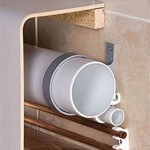Bathroom Sink Downspout Extension: A Comprehensive Guide
Bathroom sink downspout extensions are essential components for improving bathroom functionality and aesthetics. They are extensions that connect the sink's drainpipe to the main drainage system, allowing water to flow smoothly and prevent clogs and overflows. This article will explore the various types of bathroom sink downspout extensions, their benefits, and how to install them.
Types of Bathroom Sink Downspout Extensions
Bathroom sink downspout extensions come in various designs and materials to cater to different needs and aesthetics. The common types include:
- PVC Downspout Extensions: These are the most common and budget-friendly option. They are made from durable, lightweight, and corrosion-resistant PVC material, making them suitable for most bathroom applications.
- ABS Downspout Extensions: ABS (acrylonitrile butadiene styrene) downspout extensions are also durable and lightweight but offer greater impact resistance than PVC. They are often used for sinks with high-impact potential.
- Metal Downspout Extensions: Metal downspout extensions, such as those made from stainless steel or copper, offer superior durability and a more luxurious look. They are ideal for high-end bathrooms with a modern or contemporary design.
- Flexible Downspout Extensions: These extensions are made from flexible materials, such as rubber or plastic, and are ideal for tight spaces or areas with complex piping layouts. They can be easily bent and shaped to fit any configuration.
Benefits of Using Bathroom Sink Downspout Extensions
Bathroom sink downspout extensions offer numerous benefits, including:
- Improved Drainage Efficiency: By extending the drainpipe, downspout extensions create a smoother flow of water, minimizing the risk of clogs and overflows. This is especially crucial for sinks with high water usage, such as those in bathrooms with multiple users.
- Enhanced Aesthetic Appeal: Downspout extensions can be chosen in various materials and finishes to match the bathroom's design, creating a cohesive and aesthetically pleasing look. They can be painted or covered with decorative materials to blend seamlessly with the surrounding fixtures.
- Increased Accessibility: In some cases, downspout extensions can provide better accessibility for cleaning and maintenance. They extend the drainpipe, allowing easier access to the trap and the rest of the plumbing system.
- Reduced Noise: Downspout extensions can help to reduce the noise of water flowing through the drainpipe, creating a more peaceful and relaxing bathroom environment.
How to Install Bathroom Sink Downspout Extensions
Installing bathroom sink downspout extensions is a relatively simple DIY project that can be completed with basic tools and knowledge. Here's a step-by-step guide:
- Gather the necessary materials: You'll need the downspout extension, sealant, a saw, a drill, and appropriate-sized screws or bolts.
- Measure the required length: Determine the length of the extension needed to reach the drainpipe or vent. It's essential to ensure that the extension has sufficient clearance and does not obstruct any other fixtures.
- Attach the downspout extension to the drainpipe: Securely attach the downspout extension to the sink's drainpipe using the appropriate fasteners. Use sealant to prevent leaks at the joint.
- Connect the downspout extension to the main drainpipe: Connect the extension to the main drainpipe or vent, ensuring a tight and secure connection. Again, use sealant to prevent leaks.
- Test the installation: Run water down the sink and ensure that the downspout extension is working correctly and that there are no leaks.
While installation can be a simple DIY task, it is important to note that some situations might require professional help. If you are unsure about any aspect of the installation process, it's best to consult a qualified plumber.
By selecting the right type of downspout extension and ensuring proper installation, you can enhance your bathroom's functionality and aesthetics. These simple upgrades can significantly improve your bathroom experience.

Bathroom Sink Drains Downpipe Flexible Downspout Extension For Family Terrace Using Brown B Com

Flexible And Expandable Drain Pipe Tube Universal Plastic Angle Simple Extension For Bathroom Sink Sewer Replacement Accessories Temu

Kitchen Sink Downspout Flexible Stretchable Anti Odor Filter Pipe Bathroom Clogging Accessories Sewer Set Universal Inline Side Drain Save Space Temu Es

Extension Drain Pipe Flexible Plastic Downspout Angle Exhaust Tube Gutter Connector For Home Kitchen Bathroom

Flexible Drain Pipe Bathroom Sink Washing Machine Washbasin Extension 0 5m Ca

Keeney 1 4 In Plastic Slip Joint Extension Tube The Under Sink Plumbing Department At Com

Trap Adapters Simply Connect Your To Drain Pipe

Keeney 1 4 In Push On Bathroom Sink Drain Without Overflow Polished Chrome K820 76 The Home Depot

Downpipe Bathroom Sink Drain Gutter Extension Washer Hose Sewer

Extension Drain Pipe Flexible Plastic Downspout Angle Exhaust Tube Gutter Connector For Home Kitchen Bathroom Sink
Related Posts







